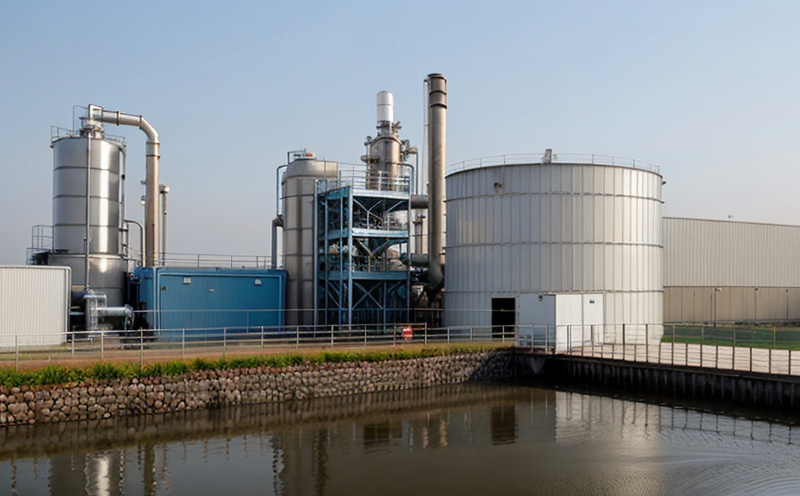ASTM D2036 Phenol Testing in Industrial Wastewater
The ASTM D2036 method is a standardized procedure designed to quantify the concentration of phenols, specifically monophenols, in water-based industrial wastewaters. This test is critical for environmental compliance and quality control in industries such as pharmaceuticals, petrochemicals, and metal finishing. Phenol testing serves several purposes: it helps monitor the effectiveness of wastewater treatment processes, ensures regulatory compliance with stringent discharge limits, and aids in identifying potential sources of contamination.
The phenolic compounds tested under ASTM D2036 are primarily those found as free phenols or present in a form that can be readily oxidized to yield free phenols. This method is not suitable for complex mixtures where other interfering substances may affect the results, such as chlorine compounds, thiophenol, or sulfur compounds.
The testing process begins with proper sampling of wastewater from industrial facilities. The sample must be collected in a manner that prevents contamination and degradation of phenols. Once collected, the sample is analyzed using a spectrophotometric procedure. This involves preparing the sample to an appropriate pH level and then measuring its absorbance at specific wavelengths corresponding to the phenolic compounds.
The precision and accuracy of this method depend on several factors including proper sample handling, reagent quality, and instrumental calibration. The results are reported in milligrams per liter (mg/L) or parts-per-million (ppm). Compliance with regulatory standards such as the EPA or local industrial effluent limits requires accurate phenol concentrations.
A detailed understanding of the process and its applications is essential for quality managers, compliance officers, and R&D engineers. This includes knowing how to interpret results in context with environmental regulations and operational efficiency goals. For procurement teams, this service ensures that suppliers meet stringent standards, thus maintaining product integrity throughout the supply chain.
Regulatory bodies like the EU's Water Framework Directive (WFD) emphasize the importance of controlling phenol levels to protect aquatic ecosystems and human health. The ASTM D2036 method ensures that industrial facilities contribute positively to these environmental goals by providing reliable data on their wastewater quality.
Understanding the broader implications of phenol testing in industrial processes is crucial for effective implementation. By adhering to this standard, industries can enhance their reputation as responsible stewards of the environment and ensure long-term sustainability. The ASTM D2036 method plays a vital role in achieving these objectives by offering a precise means to monitor and manage phenolic compounds in wastewater.
Industry Applications
| Industry Sector | Process Type | ASTM D2036 Use Case |
|---|---|---|
| Petrochemicals | Catalytic Reforming | Monitor phenol byproducts. |
| Pharmaceutical Manufacturing | Synthesis and Purification | Detect phenolic impurities in intermediate products. |
| Metal Finishing | Plating Solutions | Ensure safe discharge of plating wastewater. |
| Pulp and Paper | Bleaching Processes | Track phenol emissions from bleaching operations. |
| Textile Dyeing & Printing | Dye Fixation | Identify residual phenols in treated effluents. |
| Sugar Refining | Cane Juice Processing | Assess the impact of refining processes on wastewater composition. |
The ASTM D2036 method finds application across various industrial sectors where phenol concentrations need to be monitored. This ensures compliance with environmental regulations and supports sustainable manufacturing practices. By leveraging this standard, industries can enhance their operational efficiency while minimizing adverse impacts on the environment.
Eurolab Advantages
At Eurolab, we pride ourselves on offering unparalleled expertise in ASTM D2036 phenol testing for industrial wastewaters. Our team of experienced chemists and environmental scientists uses state-of-the-art equipment to ensure accurate and reliable results.
- Accurate Results: Leveraging advanced spectrophotometric techniques, we provide precise phenol concentration measurements that are essential for regulatory compliance.
- Comprehensive Reporting: Our reports include detailed analysis of test procedures, sample preparation, and a breakdown of results. This transparency aids in understanding the data and its implications.
- Regulatory Compliance: Eurolab’s services ensure that your industrial processes meet all relevant environmental standards, including those set by the EPA and EU directives.
- Expertise & Experience: Our team has extensive experience in handling complex samples with potential interference. We provide tailored solutions to suit specific industry needs.
- Certified Laboratory: Eurolab is accredited to numerous international standards, ensuring the highest level of quality assurance for all our services.
- Rapid Turnaround: Our efficient processes allow us to deliver results quickly, enabling timely decision-making and corrective actions when necessary.
By choosing Eurolab for your ASTM D2036 phenol testing needs, you can trust in the reliability of our services. Our commitment to excellence ensures that every test is conducted with precision and care, contributing to a more sustainable future for all industries.





